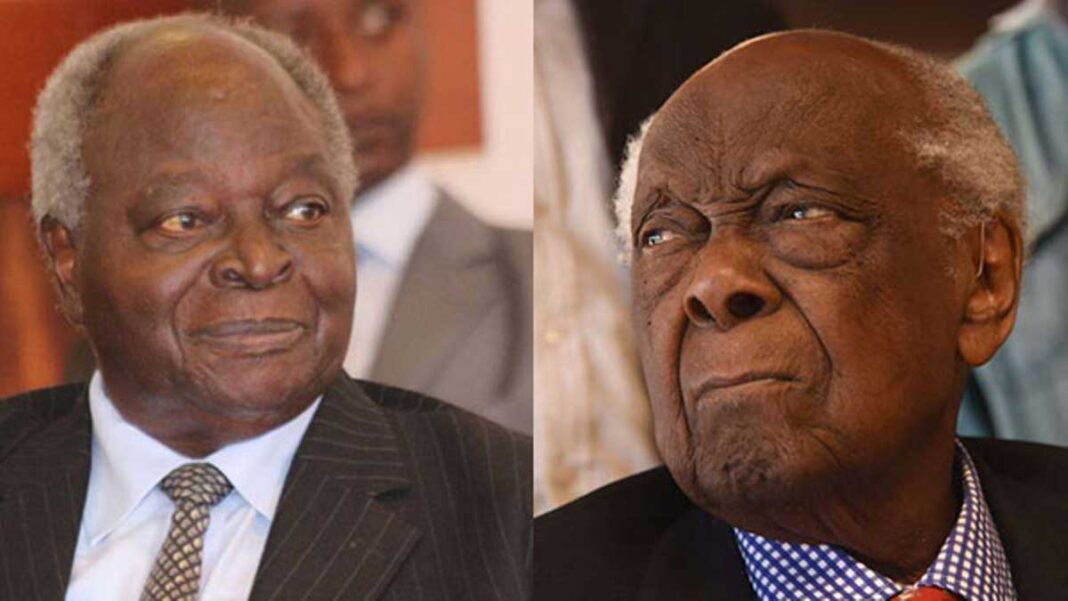Njonjo was a sworn enemy to Mwai Kibaki. The two were enemies that when Lucy Kibaki died three years ago, Njonjo didn’t bother to send a condolence message – at least not publicly — much alone drop by next door to commiserate with the Kibakis.
Kibaki and Njonjo may not have been meant to coexist in the same world because of their contrasting upbringings.
The son of a colonial chief who rode horses to school, one was born into royalty. The other was born into peasantry, with a father who barely made enough money selling raw tobacco to feed his family.
Kibaki was a straight-A student who breezed through his school exams and went on to Makerere University and the London School of Economics.
On the other hand, Njonjo’s peers claim he was a poor student who managed to get into Alliance High School, South Africa’s Fort Hare University (where he was a classmate of Robert Mugabe), and finally Lincoln’s Inn in London.
Kibaki returned to Makerere College to teach economics, while Njonjo found work as a junior clerk in colonial Kenya’s law offices.
Prejudice
At independence, President Jomo Kenyatta discovered him there and appointed him Attorney General, owing to old Jomo’s friendship with his father, retired Senior Chief Josiah Njonjo.
Right after independence, Kibaki and Njonjo clashed. Njonjo made no attempt to hide who he was working for: the old colonialists and the expatriate community.
He was a black-skinned Englishman. He never liked or believed in Africans as Attorney General, and he made it his mission to ensure that no black person gained influence in Kenya’s judiciary.
He also took advantage of any opportunity to annoy aspiring African lawyers, whose command of the English language, let alone the law, he questioned.
Njonjo was the chief promoter and protector of British conglomerates in commerce and industry, while sabotaging African ventures.
Joseph Gatuguta, a former chairman of the Transport Licensing Board, once told me how Njonjo hampered his efforts to Africanize lucrative aspects of the local transportation sector.
Investors
Gatuguta would deny expatriate permit renewals to make way for local investors, only for Njonjo’s decisions to be overturned by a British expatriate judge in favor of foreigners.
Gatuguta had to wait until Njonjo was out of the country before sneaking into State House and explaining his problems to Mzee Kenyatta.
Njonjo’s Mzungu was ordered out of the country and returned to wherever he came from by the President.
Kibaki, on the other hand, was in charge of the massive Africanisation program in newly independent Kenya as Minister of Commerce and later Finance and Economic Planning.
He was in charge when several state corporations were formed to speed up the takeover of Kenya’s commercial, financial, and industrial sectors by Africans.
Agricultural Finance Corporation, Agriculture Development Corporations, and the Industrial and Commercial Development Corporation were among them.
Leadership
The two men’s styles were as diametrically opposed as repellent poles. Njonjo was a firm believer in blackmail and coercion in politics.
Njonjo would gather damaging dossiers on opponents and selectively use them to blackmail them into submission, much like the legendary American Federal Bureau of Investigation bulldog J. Edgar Hoover.
Kibaki, for one, was a supporter of tolerance. Ngugi wa Thiong’o, a Marxist-leaning author at the time, wrote Petals of Blood (1977), which some saw as a provocation to Kenyatta’s Western-leaning government.
Surprisingly, then-Finance Minister Kibaki agreed to launch Ngugi’s book and gave a speech that became the subject of government whispers.
“It is true that writers from all over the world want to write about and comment on what is happening in their own country,” he’d said.
But one of the most horrifying aspects of the modern world is how many writers have been forced to migrate to another country in order to write about what is happening in their own.
It is a tragedy, because it means that societies are becoming intolerant… true freedom in any democratic system should be that those with a different view of the society we live in must be able to paint what picture they see so that we can have many, many pictures of the Kenya we are living in now.
Mwai Kibaki
Njonjo Hated Ngugi
Five months later, Njonjo flew to State House, Mombasa, with an Anglican cleric from Kiambu, and read passages from Petals of Blood and Ngugi’s vernacular play Ngaahika Ndenda to President Kenyatta (I will marry when I want).
They used that to persuade the President that the author was “dangerous” and needed to be detained without charge, which they did in a matter of hours!
In 1978, it was Njonjo who recommended that President Moi appoint Kibaki as Vice President.
However, the two quickly fell out when it was revealed that Njonjo only wanted Kibaki to warm his seat because he was on his way to State House.
Njonjo resigned as a civil servant and entered electoral politics in order to position himself for a takeover.
In the ensuing nerve-wracking exchange with the vice president, Kibaki launched a scathing attack on Njonjo, accusing him of assigning himself the role of “Nyayo-meter” to determine who was more “nyayo” (loyal) to the President than the other.
Last Days Of Njonjo
Njonjo’s animosity toward Kibaki persisted long after he was removed from mainstream politics following a fallout with President Moi.
In 1992, at the dawn of multiparty politics, Njonjo made a surprising U-turn and endorsed presidential candidate Jaramogi Oginga Odinga (Ford Kenya), owing to his dislike for Kibaki (Democratic Party), who appeared to be on his way to victory until Kenneth Matiba (Ford Asili) appeared at the last minute to upset the apple-cart.
Njonjo openly backed Raila Odinga in the 2007 election, perhaps hoping to see Kibaki make history as Kenya’s first one-term president!
The mutual hatred between Njonjo and Kibaki appears to have lasted until death.

